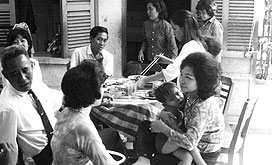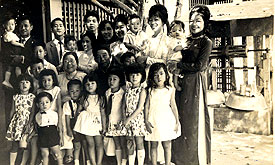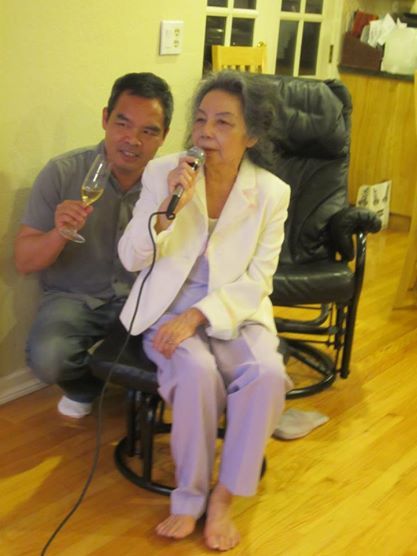Adventure Program / Chương Trình Dã Ngoại
Walk With Me Mindfully (III)
Đồng Hành Trong Chánh Niệm (III)
Hành Trình đến Đỉnh Whitney
Walk With Me Mindfully (III)
Promoting outdoor activities / hiking / backpacking /
What: Applying Buddhism and GĐPT principles and activities into the real life.
Where: High Sierra Trail
When: July 31-August 5, 2020
Why: For the love of outdoor, GĐPT, mindfulness, and Buddhism.
Coordinators: Hiep Nguyen and Phe Bach
(Htr. Tâm Định và Tâm Thường Định)
Participants: All three of us and maybe you (Htr. or ngành Thanh).
Space is very limited to 4: First come first serve by July 15th, 2020.
Cost: Free of charge, but must have an open heart and mind, smile and kindness along with the ability to walk and breathe.
Contact: @ScottieNguyen, @PheBach
"Tôi có một ý tưởng! Tôi muốn đem lá cờ này, tôi muốn đem màu Lam này đến những nơi mà tôi muốn đến! Chinh phục những ngọn núi cao, thiên nhiên hùng vỹ. Để màu Lam này được trải khắp mọi nơi! Để tiếp nối thế hệ trước, để màu Lam này được trường tồn mãi mãi! Bây giờ chuyến đi của tôi lại thêm một ý nghĩa cao cả. Công sức bỏ ra thật xứng đáng. Nhìn xa xa đó chính là Half Dome. Niềm ao ước được chinh phục. Cơ mà bây giờ chưa được, kỹ năng, sức khỏe còn yếu. Nhưng một ngày nào đó lá cờ này sẽ được cắm trên đỉnh đó!" @TienZomby Tran - Location: Tunnel View, Yosemite
The Trail Overview:
The 71-mile High Sierra Trail traverses the Sierra Nevada from Crescent Meadow in Sequoia National Park to Mt. Whitney and Whitney Portal on the eastern slope. This famous hike crosses some of the most rugged country in the Sierra, following the Middle Fork of the Kaweah River to its headwaters at Kaweah Gap and then dropping into the Kern River Canyon before swinging east again toward Mt. Whitney. Plan to enjoy a dip in the Kern Hot Springs along the way. Some hikers make an early morning start on their last day in order to experience sunrise on Mt. Whitney.
Campsites are plentiful along the route, and bear boxes are available at most popular stopping spots.
The 71-mile High Sierra Trail traverses the Sierra Nevada from Crescent Meadow in Sequoia National Park to Mt. Whitney and Whitney Portal on the eastern slope. This famous hike crosses some of the most rugged country in the Sierra, following the Middle Fork of the Kaweah River to its headwaters at Kaweah Gap and then dropping into the Kern River Canyon before swinging east again toward Mt. Whitney. Plan to enjoy a dip in the Kern Hot Springs along the way. Some hikers make an early morning start on their last day in order to experience sunrise on Mt. Whitney.
Campsites are plentiful along the route, and bear boxes are available at most popular stopping spots.
Strenuous Itinerary - Trail Detail:
Day 1 - Crescent Meadow to Bearpaw Meadow, 11.4 miles
Day 2 - Bearpaw Meadow, over Kaweah Gap and down to Big Arroyo Junction, 11.1 miles
Day 3 - Big Arroyo Junction, climb 1000' and then descend into Kern River 13 miles
Day 4 - Kern River to Junction Meadow, 9 miles
Day 5 - Junction Meadow to John Muir Trail at Wallace Creek, 4.7 miles
Day 6 - Wallace Creek to above Guitar Lake, 8.5 miles
Day 7 - Above Guitar Lake to Mt. Whitney and then down to Whitney Portal, 14.9 miles
The most difficult days on the trail are crossing Kaweah Gap, ascending and then descending into the Kern River Canyon, and - of course - Mount Whitney.
High Sierra Trail - Key Facts
Location: Sequoia National Park
Trailhead: Crescent Meadow, elevation 6,687 feet
First pass: Kaweah Gap 10,700 feet
Lowest point (midway): Kern River Canyon 6,705 feet
Highest point: Mt. Whitney, 14,508 feet
Whitney Portal: 8,323 feet
Total elevation gain: ~15,000 feet
Total elevation loss: ~13,000 feet
Hiking Distance: 71 miles
Best seasons: Mid-summer through fall
Just getting to the trailhead is a journey in itself. The trail is fairly flat (there are a few hills to climb) but the terrain is challenging. Sections of the trail are completely impassable at high tide, making timing and tide chart knowledge essential. And the weather is highly unpredictable.
This 6-day trip with will have time to relax and have more time in the wilderness. We have more time to practice walking mindfully
We'll do meditation multiple times of day. Đêm Tâm Tình Lam và chia sẻ kiến thức Phật Pháp.
Transportation:
We will need 2 cars at both trailheads. I can drive my car if anyone has a high clearance car we can use it otherwise we should rent a high clearance car.
Please refer to these articles for details:
http://www.highsierratrails.com/high_sierra_trail/trail.html
http://www.highsierratrails.com/high_sierra_trail/trail.html
Essential Gear:
Sleeping System:
-Sleeping bag (compact is key)
-Sleeping pad (must have)
-Backpacking Tent ( please bring a 1 or 2 person tent only, please ask Mr. Hiep for gear borrowing. I have one person tent, I will lend it)
Clothing system:
-3x Base layer ( any quick dry clothes, NO cotton)
-1x Mid layer ( any down or synthetic jacket, lightweight jacket that keeps you warm)
-1x Shell (a rain jacket, a rain pant is recommended because we my hike in the water due to high tide)
- 2x hiking pants, quick-dry material
-A hat ( we will hike directly under the sun, not much shade)
- An optional fleece pant to sleep at night
- At least 2 pair of hiking socks (such as SmartWool Mountaineering Socks, Darn Tough Mountaineering Sock. Good socks will prevent blister)
- Hiking shoes/Hiking boots (water shoes is optional if we must hike in the tide)
Cooking system:
- a bowl or a cup for food or drink tea.
- a water reservoir or water bottles that can carry at least 2L water (osprey hydraulic, Platypus® hydration packs or something like that)
- Cooking stove/ gas canister
- A Bear Canister
- Water filter system
Food:
- Snacks for lunch (trail mix, Payday bar, Clif bar, PROBAR, dried fruits, turkey....)
- Some noodles for breakfast but you should keep it compact
-I will be buying backpacking food for you guys, its cheaper than REI!
- No Fruits
Other:
- First aid kit
-Toiletries ( sunscreen, bug spray)
- Headlamp / flashlight (must have)
- a small knife (optional)
- hiking poles
- some toilet paper
After sorting your gear, please weight it! you whole backpack (include food and water) should weigh under 40lbs, under 35lb is recommended, under 30lb is ideal. If your weight is over 40lbs, it will make your trip worse. please leave some unwanted. My philosophy is all about minimalism, the less you carry, the more freedom you will have.
Prepared by: @ScottieNguyen, @PheBach
High Sierra Trail entering from Sequoia and out at Whitney Portal.
7/31 - Travel and set up
8/1 - 9 mile creek
8/2 - Precipice Lake
8/3 - Kern Hot Springs
8/4 - Guitar Lake
8/5 - Whitney, descend. hotel
8/6 - Pick up vehicles, drive home
Training schedule
- Cucamonga Peak
- Mt Baldy
- Mt San Jacinto
- El Cajon Mountain
Northern Cal folks please do a whole lot of stairs, and walk with 30lbs bag.
CLOTHING
- Check from head to toe, get yourself light weight stuff. You only need 2 sets of clothes and one more to be left in the car for changing after the hike.
- Beanie/face cover/mosquito net/hat
- Base Layer (2 pieces) - I use Under Armour, Ice Breaker
- Mid Layer (1 piece) - I use Arc'Teryx Atom Hoody
- Shell (1 piece) - I use Arcteryx Beta Shell
- Underwear (2 pieces) - Exofficio or Ice Breaker
- Short (2 pieces) - Prana Stretch Short
- Legging (1 or 2 pieces) - Ice Breaker or Patagonia
- Socks (2 pairs) - I use Darn Tough socks
- Shoes - Lowa Regegade or Zephyr
- Knee braces, compressions - Your liking
OTHERS
- Multi-day Pack - Gregory or Osprey are excellent choices.
- Lightweight, no more than 3lbs personal tent or Bivvy
- Trekking Poles - Black Diamond Rock Shock
- Sleeping Bag (3 season is suffice) - I use Western Moutaineering
- Sleeping Mat (A MUST) - Learn to choose the right one here https://www.rei.com/learn/expert-advice/sleeping-pads.html
- Headlamp - I use Fenix
- GPS Watch - Garmin or Suunto or whatever you like
- Water filtration system - MSR
- Boiler - MSR or Jetboil (2 per person)
- Fuel - 1 large fuel is enough for 5 days for 2
- Sunglasses, sunscreen, tylenol, bandages, pepto, Toilet Paper, Wipes, etc.
- DEETS, expect bugs especially low lying valleys and creeks
6/29/2020 - TRAINING SCHEDULE
- Please do a lot of stairs and hill walking
- If you can do a 10 miles hike from now until the trip once/week, that would be perfect
- Focus on your diet
- If you are lucky like us in Socal, please plan to have EVERY Saturday available from now until the trip, as we will go out and hike Cucamonga, Baldy, San Jacinto
- Stairs, stairs, stairs or hills hills hills. Keep walking at your own pace. Then walk with a 30lbs bag.






